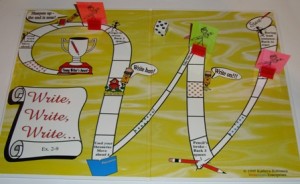#3 Get It Down
The most important thing about writing? Writing. Getting the words on the page. How to do it? Keep your pen moving. Or your fingers dancing on those keys. Never mind if you don’t know where you’re going. Just go. If you trust yourself and the process, what you want to write will show up on the page. Not in its final form, not all polished and pretty and ready for glory, but somewhere within the mess you made will be that image, that phrase, that line of dialogue. What you’d never come up with if you’d tried to “think” it on the page.
Begin anywhere. Write anything. Don’t worry about spelling, punctuation or grammar. You can clean it up later. Don’t stop to re-read or edit or fix. When you do, you move from that white-hot place of intuition and imagination and into a cerebral place of judging, evaluating, analyzing. There’s a time and place for that, but not in the first flush of creating. One of the advantages of keeping the hand moving is that you can keep ahead of the editor, the critic, and the censor. And maybe, if you’re very lucky and very fast, you can even outpace your ego.
There are dozens of methods to just getting it down: timed, focused writings; free-writes; writing in group; writing against deadline. Try setting up word counts or pages or time limits for yourself, make writing dates with someone else, or with yourself (put it on your calendar — in ink). Use writing prompts or writing exercises to get started (I know a great book that has a prompt for every day). Get writing assignments from someone else, or from any number of writing books. (My current favs are Naming the World, Now Write!, What If?, and Abigail Thomas’s Thinking About Memoir.) Having someone else — a coach, a writing buddy, a writing group, to report in to can help, too. Making bets, giving yourself rewards, bribery. I do some of all of these. (I especially like the rewards part.) Find out what works for you and then, as the saying goes, Just Do It!
What’s your best bet for just getting it down?


